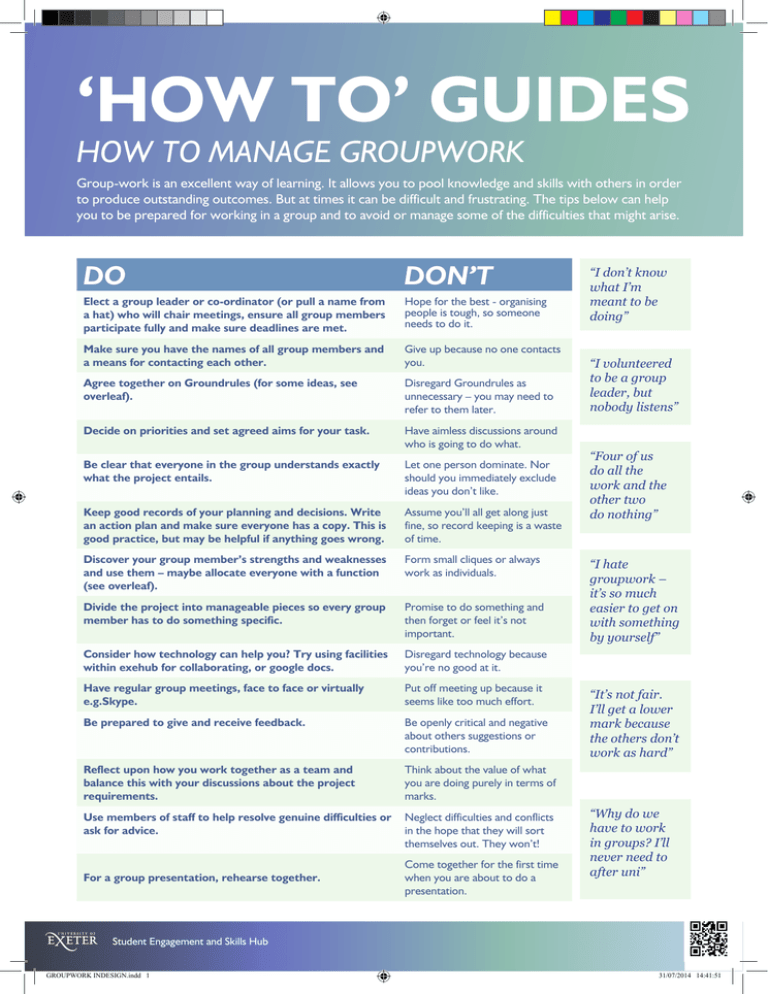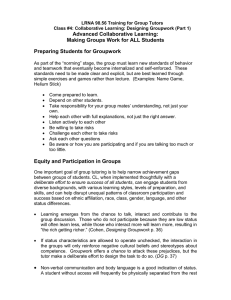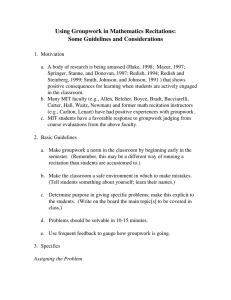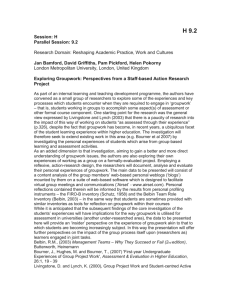‘HOW TO’ GUIDES HOW TO MANAGE GROUPWORK
advertisement

‘HOW TO’ GUIDES HOW TO MANAGE GROUPWORK Group-work is an excellent way of learning. It allows you to pool knowledge and skills with others in order to produce outstanding outcomes. But at times it can be difficult and frustrating. The tips below can help you to be prepared for working in a group and to avoid or manage some of the difficulties that might arise. DO DON’T Elect a group leader or co-ordinator (or pull a name from a hat) who will chair meetings, ensure all group members participate fully and make sure deadlines are met. Hope for the best - organising people is tough, so someone needs to do it. Make sure you have the names of all group members and a means for contacting each other. Give up because no one contacts you. Agree together on Groundrules (for some ideas, see overleaf). Disregard Groundrules as unnecessary – you may need to refer to them later. Decide on priorities and set agreed aims for your task. Have aimless discussions around who is going to do what. Be clear that everyone in the group understands exactly what the project entails. Let one person dominate. Nor should you immediately exclude ideas you don’t like. Keep good records of your planning and decisions. Write an action plan and make sure everyone has a copy. This is good practice, but may be helpful if anything goes wrong. Assume you’ll all get along just fine, so record keeping is a waste of time. Discover your group member’s strengths and weaknesses and use them – maybe allocate everyone with a function (see overleaf). Form small cliques or always work as individuals. Divide the project into manageable pieces so every group member has to do something specific. Promise to do something and then forget or feel it’s not important. Consider how technology can help you? Try using facilities within exehub for collaborating, or google docs. Disregard technology because you’re no good at it. Have regular group meetings, face to face or virtually e.g.Skype. Put off meeting up because it seems like too much effort. Be prepared to give and receive feedback. Be openly critical and negative about others suggestions or contributions. Reflect upon how you work together as a team and balance this with your discussions about the project requirements. Think about the value of what you are doing purely in terms of marks. Use members of staff to help resolve genuine difficulties or ask for advice. Neglect difficulties and conflicts in the hope that they will sort themselves out. They won’t! For a group presentation, rehearse together. Come together for the first time when you are about to do a presentation. “I don’t know what I’m meant to be doing” “I volunteered to be a group leader, but nobody listens” “Four of us do all the work and the other two do nothing” “I hate groupwork – it’s so much easier to get on with something by yourself” “It’s not fair. I’ll get a lower mark because the others don’t work as hard” “Why do we have to work in groups? I’ll never need to after uni” Student Engagement and Skills Hub GROUPWORK INDESIGN.indd 1 31/07/2014 14:41:51 GROUNDRULES - will these ground rules suit you? I must… …Always take responsibility for my own learning and progress and not rely on others. …Accept that I may not always get to do things the way I want. …Respect others – listen to their viewpoints and support their ideas. …Be prepared to compromise or to accept the ways of working of others. …Be open and honest about my strengths and areas of improvement. …Be prepared to offer and to accept constructive criticism that will improve the group’s work. …Help to maintain group cohesiveness, identity and motivation. …Pull my weight and ensure that targets and deadlines are met. TEAM FUNCTIONS Which function best reflects you? What are you good at? How can you use your strengths to support your group? Which function least reflects you? Do you want to improve in any area? THINKING • Collects and analyses information • Listens to what is being said and watches what is going on • Is sometimes quiet before contributing ideas • Thinks through the problem, sees solutions CARING • Is concerned that everybody fits in • Contributes humour and builds bridges around the team • Works to develop a team spirit • Is keen to get everybody to agree • Watches out for others’ feelings and attitudes • Eases tensions DOING • Always wants to be active • Is prepared to get involved in order to help others • Wants to see progress and adherence to plans • Gets bored with too much discussion • Hates time wasting • Works hard to finish the task LEADING ACHIEVING • Wants to succeed and strives for results • Wants to progress towards the goal quickly • Becomes impatient with delays • Challenges assumptions • Proposes improvements • Has lots of enthusiasm • Provides and communicates a vision • Clarifies objectives • Makes sure everybody is involved • Is committed and motivated • Co-ordinates group efforts • Ensures that decisions are made and that the group progresses WHY IS GROUPWORK SO IMPORTANT? For learning in your subject area: talking, discussing, or arguing in groups can be a good way to improve your learning of subject content, especially when understanding of difficult topics is required. It is particularly useful when you are asked to work on time-consuming or difficult problems when you can make use of the different abilities and interests of the team. For belonging to a social group: in much of what you do throughout life you will be part of a group. Whilst at university, you will be involved in any number of groups: in your coursework, in your living accommodation, in clubs and activity groups, in friendship groups, and so on. It is important that you can interact with confidence and make your voice heard, have your own opinions and also listen to the views and needs of others. For employability: the ability to work in teams is highly valued by employers. No matter where you work in the future, you will need to work as part of a team. It is almost impossible to find a job where this is not part of your everyday activity. If you have not had any experience of working in groups or teams, you will find it extremely difficult to complete the majority of application forms - for almost any kind of job. If you have had plenty of experience in a range of contexts, and have had the opportunity to develop a coherent vocabulary to describe these experiences, then you will be well equipped to apply for jobs and to demonstrate your skills during employer assessments. Have you seen the other Guides in this series? How to… Manage your time Read effectively Write Essays & Reports Reference and Avoid Plagiarism Manage Exams Give Presentations For further information, please go to ELE -> ‘Student Resources’ -> ‘Undergraduate Skills’. Student Engagement and Skills Hub GROUPWORK INDESIGN.indd 2 31/07/2014 14:41:51





